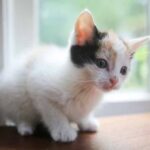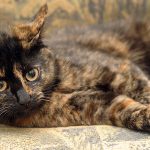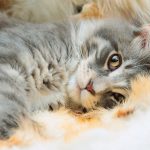Tortoiseshell and calico cats have a great deal in common. They both have the genes that create the distinctive tortoiseshell coat pattern with … [Read more...]
Flat Faced Cats – Investigating Brachycephalic Cat Breeds
Flat faced cats are widely admired for their squashed features. Their muzzle is short, nostrils are narrowed and the bridge of their nose often has … [Read more...]
33 Fascinating Tortoiseshell Cat Facts
The tortoiseshell cat has black and orange fur, in a mottled pattern. They look very dark at first glance, despite the flecks of lighter shading to … [Read more...]
Calico Cat Names – 250 Great Ideas
The best calico cat names are just as sweet as these black, orange and white patterned kittens. Your calico kitten could be from any number of amazing … [Read more...]
Maine Coon Tabby Cat: Secrets Of An Amazing Striped Giant
Most Maine Coons have stripes in their fur. So the chances are, if you’ve been lucky enough to meet one of these feline giants, it was a Maine Coon … [Read more...]
Why Are Maine Coons So Big?
Why are Maine Coon cats so big? Is it related to survival before they were fully domesticated, or have breeders engineered their size because they … [Read more...]
Tabby Cat Names
Tabby cat names come in a variety of awesome shapes and sizes, just like this cool coat color. Which can cause rather a lot of confusion when it comes … [Read more...]
Maine Coon Cat Names
Incredible cats deserve fabulous names. The Maine Coon cat is not only one of the largest of all the purebred cat breeds, but also one of the most … [Read more...]
Fun Tabby Cat Facts
The tabby cat has a grey, ginger or silver coat with dark black markings. Tabbies can be found in a huge range of cat breeds from the slinky Egyptian … [Read more...]
British Shorthair: Weight, Traits And Care
The British Shorthair is both one of Britain’s oldest and most enduringly popular cat breeds. This cat is often described as teddy bear like, and this … [Read more...]
- 1
- 2
- 3
- …
- 10
- Next Page »









